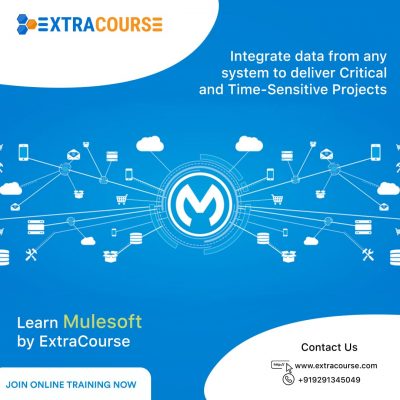Mulesoft Training Course
ExtraCourse is the NO.1 Mulesoft Training institute offering the best Mulesoft ESB Training in Hyderabad, expert guidance and 100% placement assistance..
Extra Course is a best Mulesoft training institute in Hyderabad. We offer 100% practical driven program through our unique experimental learning, focus on comprehensive practical approach. We follow a holistic curriculum which has been designed by Industrial experts in a systematic approach from the beginner’s level to a more advanced study.
Holistic Curriculum | Complete Practical Driven Learning | Case Study Approach | Be a Future Ready
Key Highlights
- Curriculum is curated by Industrial Experts in Mulesoft ESB
- Extensive study on case studies
- Handouts ,Exercises and Assignments on each and every topic
- Work on Real-time real time projects
- 100+ Hands on Practical Assignments
- Resume preparation
- Mock Interviews
- 100% Placement Assistance
- Internship Assistance
- Get Certified
What you will learn
- Build your own mule flow and develop API using API Led connectivity
- Building REST and SOAP web services
- You’ll learn Mule 3.9 from scratch to Intermediate level
- knowledge in building and debugging integrations and API implementations
- Connect to databases, files, web services, SaaS applications, JMS queues, and more.
Key Highlights
Course Name |
Type |
Course Duration |
Price |
Mulesoft |
Training |
40 hrs |
18,000/- |
Mulesoft |
Workshop |
||
Mulesoft |
Training & Workshop |
MuleSoft ESB Course Content
- Learning what Anypoint Platform is and the problems it can help you solve
- Getting familiar with the components of Anypoint Platform
- Understanding Mule applications, flows, messages, and message processors
- Creating flows graphically using connectors, transformers, components, scopes, and flow control elements Building, running, testing, and debugging Mule applications
- Reading and writing message properties
- Writing expressions with Mule Expression Language (MEL)
- Creating variables
- Understanding RESTful and SOAP web services
- Learning about what RAML is and how it can be used
- Consuming RESTful web services with and without RAML definitions
- Consuming SOAP web services
- Connecting to files, databases, and JMS queues
- Connecting to SaaS applications
- Discovering and installing connectors not bundled with Anypoint Studio
- Getting familiar with the different types of transformers
- Using the DataWeave Transform Message component
- Writing DataWeave expressions for basic and complex XML, JSON, and Java
- Using DataWeave with data sources that have associated metadata
- Adding custom metadata to data sources
- Separating applications into multiple configuration files
- Encapsulating global elements in a separate configuration file
- Creating and running multiple applications
- Creating and referencing flows and subflows
- Understanding variable persistence through subflows and flows and across transport barriers
- Handling messaging exceptions in flows
- Creating and using global exception handlers
- Specifying a global default exception strategy
- Multicasting a message
- Routing message based on conditions
- Filtering messages
- Understanding and creating synchronous and asynchronous flows
- Processing items in a collection individually
- Understanding what batch jobs are and when to use them
- Creating batch jobs to process items in a CSV file or a database
- Restricting record processing to new records
- Understanding the benefits of RESTful APIs and web services
- Using the API Designer to define APIs with RAML
- Implementing a RAML file as a RESTful web service with Anypoint Studio and APIkit
- Understanding the options for deploying applications
- Adding application properties
- Deploying and running applications in the cloud
- Deploying and running applications on-prem
- Transforming Data with DataWeave with Mule 3.7
- Introduction DataWeave
- DataWeave data transforming use cases
- DataWeave integration with Anypoint Studio
- DWL (DataWeave Expression Language)

